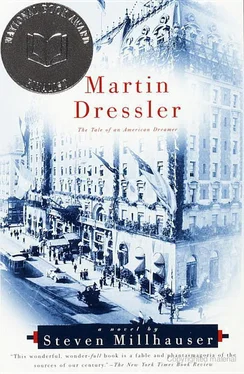The thought of Caroline’s remoteness, her enclosure in a private dream, a secret room, stirred Martin to a kind of irritable desire, and in the lamplit parlor he would turn sharply to her, as if to surprise her in some furtive act. He would see her sitting quietly there, not looking at him, with one arm resting on the dark red chairarm, the sleeve tight at the wrist, the fingers of her hand slightly curved, in a motionlessness that seemed at once tense and languorous.
And he would try to enter her dream, there in the chair beside him, no more than a foot away — so close that if he wished he could have reached out and placed his hand on the back of her curved hand; and as he imagined the palm of his hand slowly covering her hand, suddenly he imagined her naked body, he saw the ribs expanding and contracting as she breathed, the tendon taut at the side of her bent knee, the nipples stiffening, the tiny pale hairs on her stomach glittering, but he could not imagine the expression on her face.
He took to inviting the Vernons to accompany him on occasional late-morning or afternoon business expeditions, eager for Emmeline’s impressions. She argued in favor of the Boulevard over Amsterdam, despite higher rents, but urged him to consider Riverside as well, since there he could take advantage of the streams of Sunday cyclists who liked to ride up the winding avenue all the way to the Claremont Inn. Martin argued that he wanted a lunchroom in an established neighborhood, that Sunday cyclists were a weak foundation on which to erect a business, but that perhaps in two or three years, when the Drive had made its choice between the private châteaux of soda-water merchants or glove-hook heiresses and the new apartment houses and family hotels that were becoming visible in the West End — along old Eighth Avenue facing the Central Park, on the Boulevard, on the avenue corners of Seventy-second Street — perhaps then a Riverside Metropolitan would be possible. He showed her his figures, which she studied carefully, and she announced that the figures spoke in favor of an older and half-commercial Boulevard location near the bottom of the Park. He proposed the merits of two or three locations farther north, but Emmeline had become fanatical in defense of the block with the saloon and grocery and butcher shop.
He needed a place from which to conduct business. It was all very well to study figures and plan advertising campaigns in the parlor of a bachelor suite, but he needed a place in which he might hold interviews with prospective managers, a place of business uncompromised by flowered armchairs and a paneled door concealing a bedroom. He found a brown room with a window on the fourth floor of an old commercial building on Chambers Street, off lower Broadway, which he furnished with an old desk full of pigeonholes, a creaking swivel-chair, two parlor lamps, and a serviceable armchair for visitors. Mrs. Vernon wondered whether it wasn’t rather gloomy, but Emmeline declared that a pair of muslin curtains, not falsely cheery, would give it exactly the touch it needed.
After that, things moved quickly: Martin leased the vacant store on the Boulevard, advertised for managers, and conducted half a dozen interviews before choosing an energetic man named Henry McFarlane, who had hotel and restaurant experience and displayed an immediate grasp of the linked-store system. Then he called in all three managers to discuss policy, and threw himself into a vigorous advertising campaign, during which he made the decision to change the name of his group of restaurants from the Metropolitan Lunchroom to the Metropolitan Cafe. Dundee was skeptical, but offered no objection; he appeared to be losing interest in lunchrooms. Emmeline’s eager interest in all phases of the business, her confessed dissatisfaction with her idle way of life, and his desire to keep a close watch over the operation of the new restaurant led him one day to offer her the job of cashier, which she passionately accepted despite the murmured objections of Mrs. Vernon, who felt it dimly unbecoming to the family name. The next day Martin took Emmeline down to the cafe, where workmen were setting up pedestal tables along one wall, and showed her how to operate a cash register.
She was seated behind it on the day of the Grand Opening, announced by the largest publicity campaign that Martin had yet mounted on behalf of his expanding business. Martin cut the ribbon that stretched between the posts of the awning of the new Metropolitan Cafe, with its large plate-glass windows set in brick painted skyblue and its wooden Pilgrim on the sidewalk — and as the two halves of the ribbon fluttered down, the chief cook and the waiters and the dishwashers and Emmeline released into the sky hundreds of blue balloons, while the crowd on the sidewalk cheered. Martin was given to amused skepticism on the occasion of opening days, but he was surprised by the size of the turnout, by the sheer success of the posters and newspaper ads and the skyblue advertising wagons with brightly painted signs that he had hired to roll up and down the avenues two weeks in advance of opening day. As he sat at a window table with Margaret Vernon and Caroline and Walter Dundee, eating two eggs with fried steak and glancing at Emmeline in her striped percale shirtwaist on the stool behind the cash register and at the sidewalk spectators clustered at the window, he felt, even as he turned over the idea of a fourth cafe in Brooklyn, a little sharp burst of restlessness, of dissatisfaction, as if he were supposed to be doing something else, something grander, higher, more difficult, more dangerous, more daring.
THE SENSE THAT A DIFFERENT FUTURE awaited him, a future that, once he saw it rising in the distance, would be as deeply familiar to him as his own childhood, remained strong in Martin even as the success of the new cafe became a certainty. It was a certainty measurable by the nightly and weekly and monthly accounts that Martin carefully kept in his brown office with the green muslin curtains, behind a door with M. DRESSLER lettered in gold paint on the panel. On a shiny black typewriter with round black keys rimmed in nickel, Martin typed bi-weekly directions to all three managers, reminding them to keep the plate-glass windows clean at all times, proposing that they advertise daily specials on signboards set up on the sidewalk, and suggesting ways to draw in customers during slow hours. One of Martin’s experiments that proved popular was the Five-Minute Breakfast: a reduced-rate breakfast of fried eggs and hamsteak guaranteed to be served within five minutes, for people in a hurry. But the main purpose of the letters was to remind the managers that the three cafes were not independent businesses but members of a single enterprise, in which the successful operation of one member contributed to the success of the whole.
In the window of Emmeline’s cafe he installed a movable display powered by a toy steam engine. Before the puckered lips of a wooden face in profile, a flat wooden cup of coffee slowly rose and fell, rose and fell; each time it touched the lips, the head tipped back as if to drink. When Emmeline reported that people on the sidewalk were stopping to watch the moving cup of coffee, Martin installed the same display in his two other Metropolitans.
As revenues poured in, Martin continued to advertise, leasing space on billboards and in streetcars; and he began to search for a fourth location, taking the cable cars over the bridge to Brooklyn and walking the streets of neighborhoods once glimpsed from the horsecars of his childhood.
The question of a new location was one he liked to discuss with Emmeline, when he stopped in at the Boulevard cafe once or twice a week during her lunch break and whisked her off to a different restaurant, or when he accompanied her back to the hotel now and then at the end of her shift. Her brave plunge into the world of work, her quick grasp of day-to-day business and the larger design, her sharp insistent questions, all this made Martin seek her company as he had never sought the company of George Henning or Mr. Westerhoven. She seemed to have thrown herself into his business as into a romance. She listened carefully to customers, reported their occasional complaints, proposed the idea, which Martin quickly adopted, of a Metropolitan dessert: a special pastry filled with chopped apples and shaped like a Pilgrim, available to the Metropolitan through the same bakery that supplied their pies. And Emmeline listened to Martin — listened with a faint frown of attention, with a stillness of concentration, that inspired in him stricter efforts at clarity. She took sides with his ambition and kept in step with his boldest designs. One day as they were discussing the expansion of the business to Brooklyn she said to him, “But what do you want, Martin? What is it you actually want?”
Читать дальше












